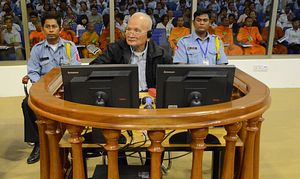For the first time since Kaing Guek Eav, alias Duch, was convicted of crimes against humanity, the former commandant of the dreaded S-21 torture and extermination center has appeared before the Khmer Rouge tribunal and left no doubt over whom he took his orders from.
From the witness stand at the United Nations-backed tribunal, now in its tenth year, Duch pointed the finger at Nuon Chea who, as Brother Number Two to Pol Pot, had far reaching powers during the 1975-79 rule over Cambodia by the ultra-Maoist Khmer Rouge that left around two million people dead.
Dressed in white with a shaved head, Duch told the court how he was ordered to kill all remaining inmates of S21, a converted school where enemies of the state were processed for execution, as the Vietnamese troops began their final advance on the capital.
“At the end, when Uncle Nuon ordered me to destroy all human beings from S-21, I was very shocked and could not do anything,” he said. “I was sick the day that the Vietnamese arrived. I was very scared.”
Testifying in case 002/02 of the Extraordinary Chambers in the Courts of Cambodia (ECCC), Duch’s evidence is considered highly important if convictions for genocide are to be secured against Nuon Chea and Khieu Samphan, a former head of state.
Like Duch, both men are already serving lengthy jail terms for crimes against humanity. They are the last of the surviving Khmer Rouge senior leaders.
Ieng Sary, the only man in history to be charged with genocide twice, died before justice could be rendered as did his wife Ieng Thirith. Husband and wife were both members of Pol Pot’s cabinet.
Duch, 74, said Nuon Chea had also ordered him to exterminate the families of the survivors and that he had grown more concerned with the fate of his own family, fearing they too would end-up in the Killing Fields.
His fears were probably real, as the court has already heard how Nuon Chea’s own nieces and their spouses were processed at S21 and killed.
The ECCC also heard evidence from lower ranked cadre, and Chum Mey, one of the few survivors who testified that he too believed Duch was following orders. Nuon Chea and Khieu Samphan have denied all allegations made against them.
“This rejection is meaningless,” Duch said.
“The rejection by Uncle Nuon is a surprise to me. I’m really surprised. I did not expect that. S-21 was like other security departments in Democratic Kampuchea,” he said.
“The fact that Uncle Nuon rejected this is wrong. In the communist party, it was the secretary and deputy secretary who made decisions.”
Case 002/02 has been hearing additional charges involving genocide against the Muslim Cham and Vietnamese, forced marriages and rape, and internal purges since it began in October 2014. Some lawyers have argued that genocide is a particularly difficult charge to prove.
It is also focusing on the S-21 Security Center; Kraing Ta Chan Security Center, Au Kanseng Security Center, and Phnom Kraol Security Center, where thousands passed through and subsequently died.
“When I was called to work, I only met one-on-one with Son Sen and Nuon Chea. I had a journal to jot down the agenda they told me on that day and I had to implement what I briefly wrote down,” Duch told the ECCC.
Son Sen, a former defense minister, was killed violently in 1997 along with 13 members of his family on the orders of Pol Pot, who feared his once-trusted lieutenant had entered negotiations to surrender to Hun Sen, who was then Cambodia’s second prime minister.
Son Sen and family were shot. Trucks were then driven over their bodies.
Luke Hunt can be followed on Twitter @lukeanthonyhunt

































